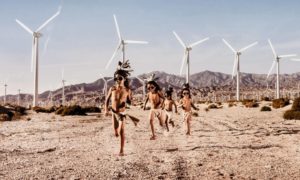LEXICON LEGACY
Published on June 27, 2024
Credit: David Trink
Ever paused a conversation to think about where our words come from ? It’s not something most people do, right? However, some of the words we use every day have origins that might surprise you. English has terms and expressions with varied germs, with roots from far-off places like Japan! But there are others thatoriginated here in the Americas , like “hurricane,” “chocolate,” and “raccoon,” which all hail from Native American languages .
If you want to know more about the stories behind these terms, join us as we uncover the fascinating origins and meanings of 10 English words rooted in Native American languages!
1
Opossum
 Credit: J D
Credit: J D
You are probably familiar with a charming animal known as the Virginia opossum . This unique creature holds the title of being the only marsupial species native to North America , and it was the Powhatan people, early inhabitants of Virginia’s Tidewater region, who gave this particular animal its name.
Our word ” opossum ” comes from the Algonquian Powhatan term apässum****. But what does apässum mean? Well, it simply **translates to “white animal,”**describing some of the color shades of this cute little beast.
2
Chocolate
 Credit: Kier in Sight Archives
Credit: Kier in Sight Archives
Who can resist the temptation of a delicious piece of chocolate ? Definitely not us! This treat is still the star in confectionery and pastry shops, but did you know its history goes back many centuries?
In fact, we thank the ancient Mesoamericans — Olmecs, Mayans, and Aztecs— not just for the tasty chocolate itself, but also for giving us the word we use to name it.
In Nahuatl, the Aztec language, xocolātl (translated to “bitter water”) referred to the bitter drink they made from the chocolate plant. When the Spanish arrived, they embraced both the delicious product and its name. The Nahuatl word “xocolātl” evolved into the Spanish chocolate , which soon spread across Europe. The name then took on similar forms in various languages, including English ( chocolate ), German ( schokolade ), French ( chocolat ), and Italian (cioccolato ).
3
Moccasin
 Credit: Eric Lagergren
Credit: Eric Lagergren
Have you ever put your feet into a good pair of moccasins ? Even if you haven’t, we are sure you are familiar with this type of shoes. Whether you wear them indoors as slippers or outdoors as stylish casual footwear, we have Native Americans to thank for these practical shoes.
It was the Powhatan people who gave these shoes their name, using the wordmakasin , which eventually transformed into the English term “moccasin.” Back in the 17th century and earlier, this word specifically described a type of footwear typically made from soft deerskin, with a sole made from a single piece of leather.
4
Caucus
 Credit: Marco Oriolesi
Credit: Marco Oriolesi
This is another word that reflects the flexible and adaptive nature of language. Although its origin is debated , one theory suggests that “caucus” might come from the Algonquian word caucauasu , which means “counselor” or “advisor.”
The word as we know it today first appeared in English in the mid-18th century. In fact, one of its earliest known uses comes from the writings of none other than John Adams in 1763 , when he used it to describe a meeting of political party members.
5
Racoon
 Credit: Gary Bendig
Credit: Gary Bendig
The opossum isn’t the only creature named by Native Americans . Just like many other animals living near Indigenous communities, the raccoon also owes its name to the Powhatan people.
The original Powhatan word for raccoon is aroughcun or arathkone . It can be translated to “the one that scratches with hands,” describing one of the typical behaviors of raccoons.
European settlers adapted the word into English in the 17th century , with early spellings varying from “aroughcun” to “raugroughcun” and “rarowcun” before finally settling on “raccoon.”
6
Hurricane
 Credit: Alexey Demidov
Credit: Alexey Demidov
Did you know that the English word ” hurricane ” is actually an adaptation of a Spanish term? But wait, there’s more! The Spanish word itself comes from aTaino expression.
The Tainos were an Indigenous group from the Caribbean that had their own word for the powerful storms that hit the area: juracán , which also was the name for the god of chaos .
When the Spanish arrived in the Americas and had to face these fierce Caribbean storms, they borrowed the Taino term, which became the Spanishhuracán .
7
Cigar
 Credit: silviu bocan
Credit: silviu bocan
Something similar happened with the word “cigar.” This time, it was the Mayanswho first named this product, calling it sikar , which translates to “to smoke rolled tobacco leaves.” Pretty specific, right? While the Mayan word originally referred to the act of smoking tobacco, the Spanish later adopted it, transforming it into cigarro to describe the rolled tobacco leaves many people smoke.
Subsequently, both the word and the product gained huge popularity in America and Europe. The term was adapted into various languages , resulting in language-specific versions such as “cigar” in English , cigare in French, andZigarre in German.
8
Skunk
 Credit: Elisa Stone
Credit: Elisa Stone
The Abenakis , who lived in regions now known as the northeastern United States and parts of eastern Canada like Maine, New Hampshire, Vermont, and Quebec, had this word in their language: s eganku .
Want to know what this term means? Well, s_eganku_ can be translated as “the one that emits a smell,” and it was sometimes interpreted as “the urinating fox”! It sounds like the title of a fun children’s tale, right? But that’s the fitting name the Abenaki people gave to the skunk .
It was this word that the English borrowed and adapted. It first appeared in English in the early 17th century with spellings like “squuncke” and “skuncke” before finally settling on the “skunk” we know today.
9
Hickory
 Credit: Aurora K
Credit: Aurora K
** Pawcohiccora **is the beautiful word used by the Native American Powhatanpeople to call a type of food made from hickory nuts. The Powhatan would gather these nuts, chop them, and extract their oil to create delicious pastes or drinks.
Some hypotheses claim that when European settlers arrived in North America, they adopted this word, which was later shortened and adapted into English as “hickory,” as seen in some 17th-century texts. Over time, the meaning broadened and came to refer to the hickory tree itself, native to North America.
10
Anorak
 Credit: Cameron Stow
Credit: Cameron Stow
The anorak , that trendy and cool garment worn by people of all ages today, has a history that’s older than you might think!
The Inuit are indigenous peoples who primarily inhabit the Arctic regions of Canada, Greenland, Alaska, and even some parts of Russia. Among the words that make up the rich Inuit vocabulary is anoraq , which refers to a type of clothing usually made from caribou or seal skin.
The English took the word and gave it a twist to transform it into “anorak,” describing that comfy type of jacket that keeps us cozy and dry, just like the Inuit’s anoraq !




